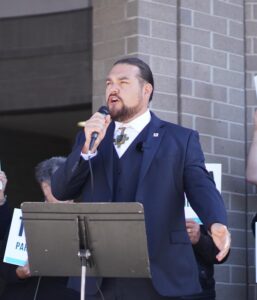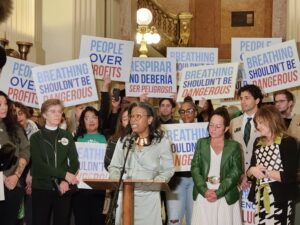A bill that sought to unwind concessions granted to businesses at two key Colorado Air Quality Control Commission rulemakings last year is dead after it failed to be brought up for a committee hearing Monday in time for it to take all the steps necessary to pass.
House Bill 1339, sponsored by Democratic Reps. Mike Weissman of Aurora and Manny Rutinel of Commerce City, was one of a handful of business-facing bills suffering similar fates as the Legislature nears its Wednesday adjournment deadline. But while most of the others were lower-profile measures or bills killed off as part of compromise deals, HB 1339 was presented by environmental-justice advocates as a strong way to ensure that state agencies comply with the legislative intent of precedent-setting bills.
In the form in which it advanced from the House Energy & Environment Committee to the House Appropriations Committee on April 18, it was to send a message to the AQCC that legislators felt its implementations of mandated rules were too permissive to industry. The rules it targeted were regulations on emitters in disproportionately impacted communities and the Greenhouse Gas Emissions and Energy Management for Manufacturers Phase 2 (GEMM 2) rule that affects the state’s largest manufacturing facilities.
How the bill would have overturned rulemakings
On GEMM 2, which drew more business participation than any rulemaking in memory, HB 1339 sought to repeal the ability for certain plants to continue with expansion projects that will produce immediate emissions boosts but reduce pollutants in the long term. Instead, it aimed to sets a sector cap of 97 million metric tons of allowable carbon dioxide emissions from 2025 to 2030, which would bar some of the planned growth.

An aerial view of the Natural Soda plant in Rio Blanco County, one of 18 facilities regulated by GEMM 2 rules
The bill also sought to ban the ability of emitters to pay into a fund to assist emission reductions efforts statewide if the manufacturing facilities can’t do any more to reduce their own emissions in ways that are economically feasible. Business leaders who pushed for the fund said it would avoid companies choosing to relocate workers and work to other states in cases where they couldn’t meet certain clean-up standards for particularly hard-to-decarbonize operations.
On the DICs rulemaking, meanwhile, HB 1339 would have required emissions limits and regulations in DICs be as strict as those in cumulatively impacted communities, which have multiple factors like poverty and high minority populations that define a DIC. It also would have required companies to meet enhanced modeling and monitoring requirements on all new and modified sources of emissions and would have mandated for accounting for and cleaning up of a greater range of toxic air contaminants.
Why environmentalists sought the changes
Supporters said that in making the concessions in the rulemakings, the AQCC ignored directives of the 2021 Environmental Justice Act and set up regulations that would allow more emissions in already polluted areas and let polluters pay to avoid making upgrades. They offered harsh words for state regulators, with Rutinel saying the rulemakings were a “betrayal” to impacted communities.
But in addition to manufacturers, oil-and-gas producers and business groups saying such post-decision changes undermined all AQCC rulemakings and moved regulatory goalposts for them once again, the bill earned opposition from Gov. Jared Polis’ administration. The Colorado Department of Public Health & Environment defended the rulemakings as a process that took into account concerns from all sides of these arguments and said it would require nearly $900,000 to implement the new rules in a tight budget year.
Ean Thomas Tafoya — Colorado president of GreenLatinos, which supported HB 1339 — said Weissman told supporters that he wouldn’t attempt to move the bill because he didn’t have the votes to get it through its next committee and through the House. The strong opposition from the Polis administration, evident in its unworkable fiscal request, had the biggest impact in dooming it, he said.

Ean Thomas Taffy, Colorado state director for GreenLatinos
“The community is pretty devastated,” Tafoya said. He added, however, that his organization, Earthworks and 350 Colorado have sued the state over the DICs ruling to require the same strict regulations for DICs as for CICs and that he believes a settlement to those grievances could come still from the legal action.
“Responsible legislating” to uphold rulemakings
Doug Benevento, a Holland & Hart partner who represented a Colorado Chamber of Commerce coalition at the GEMM 2 hearings, expressed relief at the death of HB 1339, saying a vote to change a well-considered AQCC ruling would have been disastrous. Without the ability for major manufacturers to complete planned expansions and to pay into a fund that would be used to help cut emissions across the state, there would have been significant job loss with “a negligible, if any, environmental gain,” he said.
“This is something that should be celebrated as responsible legislating,” Benevento said of letting the bill die on the calendar, as it would have had to get to the House floor and get preliminary approval Monday to have any chance to pass both chambers by Wednesday. “I think the precedent that’s been set is if industry is united and they pull in outside groups like unions to talk about the negative outcomes that could occur, as happened here, we can defeat it.”
Another bill that died on the calendar by failing to advance to the House floor Monday was HB 1330, a measure that would have required more modeling for air-quality permits and barred permits for facilities that would have added any emissions in DICs. Sponsoring Democratic Reps. Jennifer Bacon of Denver and Jenny Willford of Northglenn agreed last week to kill that bill as part of a deal to nix three significant regulatory upgrade proposals in exchange for lesser new regulations and a new fee on oil and gas production.

Colorado state Rep. Jennifer Bacon speaks about a new slate of environmental bills in February at the Capitol.
Also dying Monday was Senate Bill 130, which sought to raise caps on noneconomic damages in medical malpractice lawsuits slightly. That went away due to a deal announced Sunday that would permit greater cap growth through a newly introduced bill in exchange for the removal of ballot initiatives, including one that would have eliminated caps for noneconomic damages in lawsuits.
Some bills died from neglect rather than deals
The Senate Appropriations Committee failed to consider SB 127, a bill from Sen. Barbara Kirkmeyer, R-Brighton, to establish a new dredge-and-fill permitting program to regulate state waterways. But that was planned too after Kirkmeyer agreed to merge parts of her bill with a competing measure from House leaders to establish a consensus program for permitting construction activities that could impact streams and other wetlands.
However, two business-focused bills that were not part of deals but that had been sitting in the House Appropriations Committee for more than three months also died when they were not brought up for hearings Monday.
HB 1015, sponsored by Democratic Rep. Stephanie Vigil of Colorado Springs, would have required employers to hang posters in their facilities and include in employee handbooks education materials about suicide prevention. It advanced from the House Business Affairs and Labor Committee unanimously in January but carried a $165,000 fiscal note, and while business leaders did not oppose it, some asked why they should be responsible for such an important aspect of behavioral health.
HB 1083, sponsored by Willford and Democratic Rep. Kyle Brown of Louisville, sought to fund a study of the insurance market for construction professionals, as limited and costly premiums have been identified as a major cause for the dearth of condominium building. Opponents of a construction-defects reform bill even pointed to HB 1083, which cleared its first House committee in January, as something to be enacted before changes in liability law, but even after the reform bill died Friday, there was no effort to advance the study bill.
